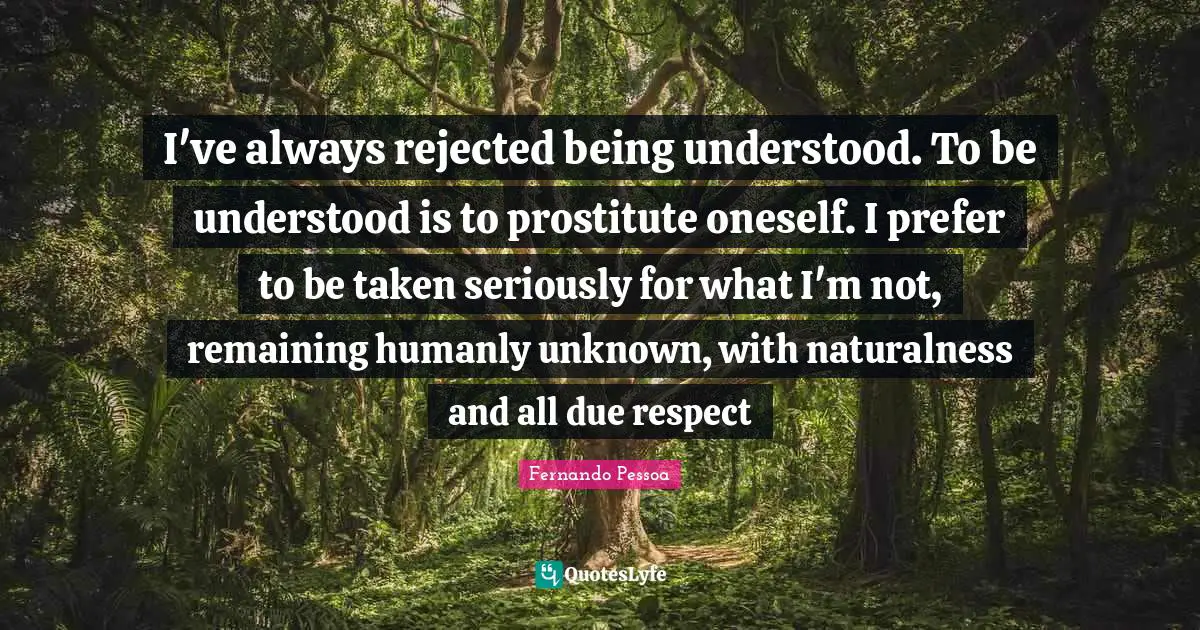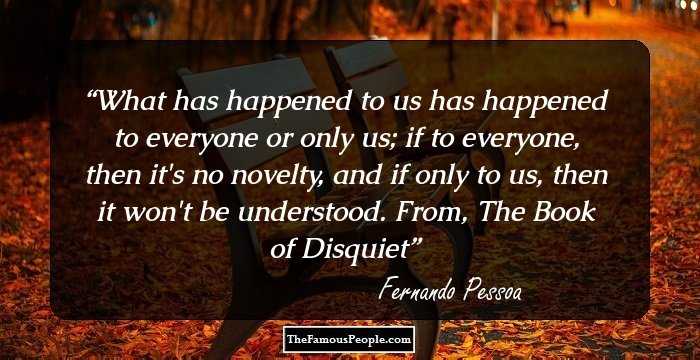By the time this post will be published, I will have finished Fernando Pessoa's “The Book of Disquiet”. This is not only the longest book I've read so far (926 pages) but also one that I'll return to, as I do with “The Picture of Dorian Grey” and “The Silmarillion”. Pessoa's masterpiece can be both anxiety-inducing and relaxing, both liberating and depressing. That's what makes it existentialist, and that's one of the reasons why I enjoy it so much. As an introverted, solitary person, I understand many feelings and thoughts expressed in the book. After all, most of us just want to be left alone and have some peace. Even though I'm not a literary critic, I want to at least attempt to explain why I find this to be so good.
This book, just like Pessoa's life, tends to be quite peculiar and difficult to explain. It explores themes ranging from the boredom of routines to the paradoxes that define life as presented through the perspective of an assistant bookkeeper: Bernardo Soares, who lives and works in Lisbon, on Rua dos Douradores. We get to know his life and ideas in the style of a journal of dreaming. We stroll across Lisbon, equally sick of superficiality and fascinated by complexity. Likewise, we get to know his coworkers, his ideas, and his habits. Now, what's interesting about Soares is that he's only a semi-heteronym. Pessoa admitted that Soares is only a mutilated version of himself, one that's slightly more cynical. The book deserves the title of “the weirdest autobiography so far”.
From an organizational perspective, its structure is (almost) absent. It makes sense to be read both from the beginning to the end, and the other way around. It's made up of short, but intense passages collected from the writings that Pessoa hid in his bottomless chest. Not only that, but it's not even organized in chapters, which honestly makes it even easier to read. The thing is, just because it's not hard to read does not mean it lacks complexity. As I mentioned, each passage is intense, and we need to do some mental gymnastics to understand them. All Pessoa wanted was to be able to exist without being in pain because of his very existence. Did he get that? I don't think so, since he might have drunk himself to death.
He suffered from the same illness as Eminescu and many other writers: the curse of intelligence and self-awareness. Intelligence is often misunderstood and can create a feeling of alienation. Clever people typically feel like they don't belong in either crowd. As Hemingway put it, “Happiness in intelligent people is the rarest thing I know”. In addition to that, I read that the more active the mind is, the more prone it is to mental illness. As for self-awareness, it is a paradox (unless it leads to self-acceptance): those who have it can feel both better and worse than they did before. It's a double-edged sword that can be equally helpful and harmful at the same time.
Still, to better understand any work, we need to take a look at the author's life as well. When he was around 5 or 6 years old, both his father and his brother died. His mother remarried and moved to South Africa with young Fernando and her new husband. He learned the language quickly and got ahead of his class just as quickly. He aced his exams, graduated a bit early, and returned to Lisbon, a city which he never left again. Along with a few other writers, he founded the modernist magazine and literary group “Orpheu” that was going to bring Portuguese literature into the 20th century. He published under several heteronyms, among which three (aside from Soares) are dominant: Alberto Caeiro, a neopagan poet who lived in the countryside, Álvaro de Campos, a ship engineer with a powerful and even wrathful writing style, and Ricardo Reis, a medic with an interest in stoicism.
What does all this have to do with the work in question? Soares is a character like the other three, but then again, he's the closest to reality, the one most influenced by Pessoa's life. The sorrows he goes through are a mirror image of Fernando's: one is an orphan, the other is fatherless; one is a bookkeeper, the other is a translator, and so on. Both find existence tedious and repetitive, both are dreamers, both have trauma™ and both write about their thoughts. Even their names are similar. Also, I'm probably projecting, but I would even go as far as to say they were both asexuals. (If I recall correctly, Pessoa defended gay writers under the Salazar regime. However, his sexuality, or rather his interest in it, is still debated. But who knows? Maybe straight men do write long, lacrimogenous poems about Emperor Hadrian).
With that in mind, let's discuss themes: they range from anything to everything. You can find ideas about many major topics such as life, love, art, existence (obvs.), travel, social situations, writing, possession, fame, and so on. The oddly interesting part is that he starts writing about something and then contradicts himself in the middle of the chapter, trying to explain a different point. This shows once more that he's not only aware that he's a living paradox (like most of us) but he also sees them in everyone and everything. Also, something that often took me aback was the sense of humour. He writes that irony is a way to become “conscious of our consciousness”, which reminds me of a joke I read in a review on GoodReads. It goes something along the lines of: Who are the 4 greatest modernist poets of Portugal? Fernando Pessoa (…along with de Campos, Caeiro and Reis :).
How did I discover this book? Last year, I was in Portugal with an Erasmus project. It was there that I learned about some writers such as Camões, Saramago, and, of course, Pessoa. As soon as the teacher introduced him as a solitary introvert, I had a gut feeling I might be interested in his writing. A year later, when I finally got to read “The Book of Disquiet”, I realized that I was, indeed, right. It's one of the most beautifully sad works that I've read so far, as the YouTuber “Better Than Food” put it. Honestly, I might as well continue on this road with works like: “I Have More Than One Soul”, “A Little Larger Than the Entire Universe”, “The Year of the Death of Ricardo Reis”, “The Lusiads” and so forth.
In a nutshell, it's a work of art that I find fascinating, to say the least. Again, It's a book I'll probably return to and get my daily dose of anxiety and relaxation. I could write about it for ages, but now I'll simply list some of my favourite quotes. Now, back to the tea!🍵

(source: Pinterest)

(source: Pinterest)

(source:quotes.thefamouspeople)

(source: quoteslyfe)

(source: thefamouspeople)
Niciun comentariu:
Trimiteți un comentariu